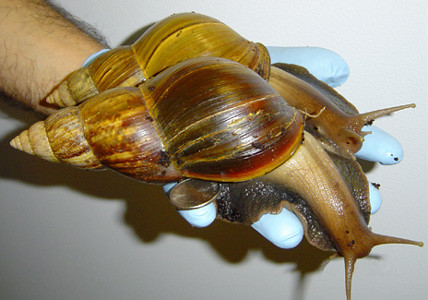
It's the second week of classes for the summer session, which means that it's about time to add new material to the stories I tell to my students. First, here's an update to Giant African Snails returning to Florida, itself a follow-up to Giant African Snails invading Latin America.
As I expected, when I tell the story about “on a rainy day, when the snails all came out and crawled all over the road, the cars would squish them and cars would end up skidding on the squished snail,” the students say "Ew." This semester, I was thinking of adding the video by the Florida Agricultural Commission. However, I found something even better: Why giant snails are a problem for Florida.
Giant African land snails pose a big threat to Florida. CNN's John Zarrella explains why.I showed that to my Biodiversity students this week. They were suitably impressed. If there's time, I'll show the same video to my Environmental Students in a couple of months.
Next, I showed my Environmental Science students the Discovery News video from Discovery News and PhysOrg on colony collapse disorder to explain the importance of bees and their ecosystem services to humans. Those students were suitably impressed as well. I could have done more to impress on the students the importance of pollinators, including mentioning the following article from North Carolina State University: Bee Biodiversity Boosts Blueberry Crop Yields.
Research from North Carolina State University shows that blueberries produce more seeds and larger berries if they are visited by more diverse bee species, allowing farmers to harvest significantly more pounds of fruit per acre.That would have been cool. I'll have another opportunity to explain the importance of biodiversity as natural capital in a few weeks. Maybe I'll mention this research then.
“We wanted to understand the functional role of diversity,” says Dr. Hannah Burrack, an associate professor of entomology at NC State and co-author of a paper on the research. “And we found that there is a quantifiable benefit of having a lot of different types of bees pollinating a crop.”
No comments:
Post a Comment